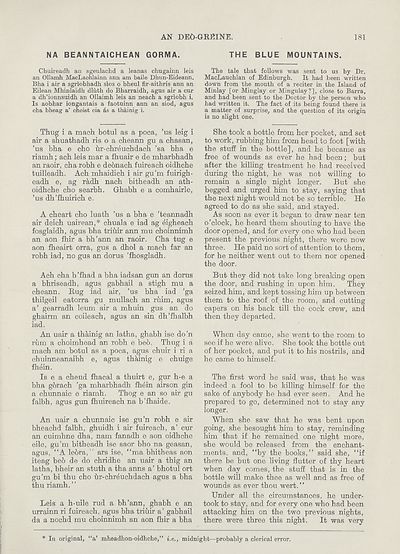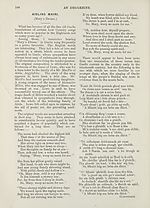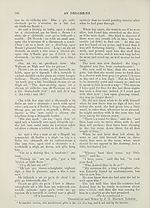An Comunn Gàidhealach Publications > Deo-gréine > Volume 17, October 1921 to September 1922
(189) Page 181
Download files
Complete book:
Individual page:
Thumbnail gallery: Grid view | List view

AN DEO-GREINE.
181
NA BEANNTAICHEAN GORMA.
Chuireadh an sgeulachd a leanas chugainn leis
an Ollamh MacLaohlainn ann am bail© Dhun-Eideann.
Bha i air a sgriobhadh slos o bheul fir-aithris ann an
Eilean Mhinlaidh dluth do Bharraidh, agus air a cur
a dh’ionnsuidh an Ollaimh leis an neach a sgriobh i.
Is aobhar iongantais a faotuinn ann an siod, agus
cha bheag a’ cheist cia as a thainig i.
Thug i a mach botul as a poca, ’us leig i
air a shuathadh ris o a cheann gu a chasan,
’us bha e cho ur-ehreuchdach ’sa bha e
riamh; ach leis mar a fhuair e de mharbhadh
an raoir, cha robh e deonach fuireach oidhche
tuilleadh. Ach mhaidich i air gu’m fuirigh-
eadh e, ag rkdh nach bitheadh an ath-
oidhche cho searbh. Ghabh e a comhairle,
’us dh’fhuirich e.
A cheart cho luath ’us a bha e ’teannadh
air deich uairean,* chuala e iad ag digheach
fosglaidh, agus bha triixir ann mu choinnimh
an aon fhir a bh’ann an raoir. Cha tug e
aon fheairt orra, gus a dhol a mach far an
robh iad, no gus an dorus ’fhosgladh.
Aeh cha b’fhad a bha iadsan gun an dorus
a bhriseadh, agus gabhail a stigh mu a
cheann. Rug iad air, ’us bha iad ’ga
thilgeil eatorra gu mullach an riiim, agus
a’ gearradh leum air a mhuin gus an do
ghairm an coileach, agus an sin dh’fhalbh
iad.
An uair a thkinig an latha, ghabh ise do’n
rum a choimhead an robh e bed. Thug i a
mach am botul as a poca, agus chuir i ri a
chuinneanaibh e, agus thkinig e chuige
fh&n.
Is e a cheud fhacal a thuirt e, gur h-e a
bha gbrach ’ga mharbhadh fhdin airson gin
a chunnaic e riamh. Thog e an so air gu
falbh, agus gun fhuireach na b’fhaide.
An uair a chunnaic ise gu’n robh e air
bheachd falbh, ghuidh i air fuireach, a’ cur
an cuimhne dha, nam fanadh e aon oidhche
eile, gu’m bitheadh ise saor bho na geasan,
agus, “A lebra,” ars ise, “ma bhitheas aon
iteag bed de do chridhe an uair a thig an
latha, bheir an stuth a tha anns a’ bhotul ort
gu’m bi thu cho ur-chrbuchdaeh agus a bha
thu riamh.”
Leis a h-uile rud a bh’ann, ghabh e an
urrainn ri fuireach, agus bha triiiir a’ gabhail
da a nochd mu choinnimh an aon fhir a bha
THE BLUE MOUNTAINS.
The tale that follows was sent to us by Dr.
MacLauchlan of Edinburgh. It had been written
down from the mouth of a reciter in the Island of
Minlay [or Minglay or Mingulay?], close to Barra,
and had been sent to the Doctor by the person who
had written it. The fact of its being found there is
a matter of surprise^ and the question of its origin
is no slight one.
She took a bottle from her pocket, and set
to work, rubbing him from head to foot [with
the stuff in the bottle], and he became as
free of wounds as ever he had been; but
after the killing treatment he had received
during the night, he was not willing to
remain a single night longer. But she
begged and urged him to stay, saying that
the next night would not be so terrible. He
agreed to do as she said, and stayed.
As soon as ever it began to draw near ten
o’clock, he heard them shouting to have the
door opened, and for every one who had been
present the previous night, there were now
three. He paid no sort of attention to them,
for he neither went out to them nor opened
the door.
But they did not take long breaking open
the door, and rushing in upon him. They
seized him, and kept tossing him up between
them to the roof of the room, and cutting
capers on his back till the cock crew, and
then they departed.
When day came, she went to the room to
see if he were alive. She took the bottle out
of her pocket, and put it to his nostrils, and
he came to himself.
The first word he said was, that he was
indeed a fool to be killing himself for the
sake of anybody he had ever seen. And he
prepared to go, determined not to stay any
longer.
When she saw that he was bent upon
going, she besought him to stay, reminding
him that if he remained one night more,
she would be released from the enchant¬
ments, and, ‘‘by the books,” said she, “if
there be but one living flutter of thy heart
when day comes, the stuff that is in the
bottle will make thee as well and as free of
wounds as ever thou wert.”
Under all the circumstances, he under¬
took to stay, and for every one who had been
attacking him on the two previous nights,
there were three this night. It was very
In original, “a’ mheadhon-oidhche,” i.e., midnight—probably a clerical error.
181
NA BEANNTAICHEAN GORMA.
Chuireadh an sgeulachd a leanas chugainn leis
an Ollamh MacLaohlainn ann am bail© Dhun-Eideann.
Bha i air a sgriobhadh slos o bheul fir-aithris ann an
Eilean Mhinlaidh dluth do Bharraidh, agus air a cur
a dh’ionnsuidh an Ollaimh leis an neach a sgriobh i.
Is aobhar iongantais a faotuinn ann an siod, agus
cha bheag a’ cheist cia as a thainig i.
Thug i a mach botul as a poca, ’us leig i
air a shuathadh ris o a cheann gu a chasan,
’us bha e cho ur-ehreuchdach ’sa bha e
riamh; ach leis mar a fhuair e de mharbhadh
an raoir, cha robh e deonach fuireach oidhche
tuilleadh. Ach mhaidich i air gu’m fuirigh-
eadh e, ag rkdh nach bitheadh an ath-
oidhche cho searbh. Ghabh e a comhairle,
’us dh’fhuirich e.
A cheart cho luath ’us a bha e ’teannadh
air deich uairean,* chuala e iad ag digheach
fosglaidh, agus bha triixir ann mu choinnimh
an aon fhir a bh’ann an raoir. Cha tug e
aon fheairt orra, gus a dhol a mach far an
robh iad, no gus an dorus ’fhosgladh.
Aeh cha b’fhad a bha iadsan gun an dorus
a bhriseadh, agus gabhail a stigh mu a
cheann. Rug iad air, ’us bha iad ’ga
thilgeil eatorra gu mullach an riiim, agus
a’ gearradh leum air a mhuin gus an do
ghairm an coileach, agus an sin dh’fhalbh
iad.
An uair a thkinig an latha, ghabh ise do’n
rum a choimhead an robh e bed. Thug i a
mach am botul as a poca, agus chuir i ri a
chuinneanaibh e, agus thkinig e chuige
fh&n.
Is e a cheud fhacal a thuirt e, gur h-e a
bha gbrach ’ga mharbhadh fhdin airson gin
a chunnaic e riamh. Thog e an so air gu
falbh, agus gun fhuireach na b’fhaide.
An uair a chunnaic ise gu’n robh e air
bheachd falbh, ghuidh i air fuireach, a’ cur
an cuimhne dha, nam fanadh e aon oidhche
eile, gu’m bitheadh ise saor bho na geasan,
agus, “A lebra,” ars ise, “ma bhitheas aon
iteag bed de do chridhe an uair a thig an
latha, bheir an stuth a tha anns a’ bhotul ort
gu’m bi thu cho ur-chrbuchdaeh agus a bha
thu riamh.”
Leis a h-uile rud a bh’ann, ghabh e an
urrainn ri fuireach, agus bha triiiir a’ gabhail
da a nochd mu choinnimh an aon fhir a bha
THE BLUE MOUNTAINS.
The tale that follows was sent to us by Dr.
MacLauchlan of Edinburgh. It had been written
down from the mouth of a reciter in the Island of
Minlay [or Minglay or Mingulay?], close to Barra,
and had been sent to the Doctor by the person who
had written it. The fact of its being found there is
a matter of surprise^ and the question of its origin
is no slight one.
She took a bottle from her pocket, and set
to work, rubbing him from head to foot [with
the stuff in the bottle], and he became as
free of wounds as ever he had been; but
after the killing treatment he had received
during the night, he was not willing to
remain a single night longer. But she
begged and urged him to stay, saying that
the next night would not be so terrible. He
agreed to do as she said, and stayed.
As soon as ever it began to draw near ten
o’clock, he heard them shouting to have the
door opened, and for every one who had been
present the previous night, there were now
three. He paid no sort of attention to them,
for he neither went out to them nor opened
the door.
But they did not take long breaking open
the door, and rushing in upon him. They
seized him, and kept tossing him up between
them to the roof of the room, and cutting
capers on his back till the cock crew, and
then they departed.
When day came, she went to the room to
see if he were alive. She took the bottle out
of her pocket, and put it to his nostrils, and
he came to himself.
The first word he said was, that he was
indeed a fool to be killing himself for the
sake of anybody he had ever seen. And he
prepared to go, determined not to stay any
longer.
When she saw that he was bent upon
going, she besought him to stay, reminding
him that if he remained one night more,
she would be released from the enchant¬
ments, and, ‘‘by the books,” said she, “if
there be but one living flutter of thy heart
when day comes, the stuff that is in the
bottle will make thee as well and as free of
wounds as ever thou wert.”
Under all the circumstances, he under¬
took to stay, and for every one who had been
attacking him on the two previous nights,
there were three this night. It was very
In original, “a’ mheadhon-oidhche,” i.e., midnight—probably a clerical error.
Set display mode to:
![]() Universal Viewer |
Universal Viewer | ![]() Mirador |
Large image | Transcription
Mirador |
Large image | Transcription
| An Comunn Gàidhealach > An Comunn Gàidhealach Publications > Deo-gréine > Volume 17, October 1921 to September 1922 > (189) Page 181 |
|---|
| Permanent URL | https://digital.nls.uk/127172241 |
|---|
| Description | Leabhar 17, Treasamh Mios an Fhoghair 1921 gu Dara Mìos an Fhoghair 1922 |
|---|---|
| Attribution and copyright: |
|
| Description | This contains items published by An Comunn, which are not specifically Mòd-related. It includes journals, annual reports and corporate documents, policy statements, educational resources and published plays and literature. It is arranged alphabetically by title. |
|---|
| Description | A collection of over 400 items published by An Comunn Gàidhealach, the organisation which promotes Gaelic language and culture and organises the Royal National Mòd. Dating from 1891 up to the present day, the collection includes journals and newspapers, annual reports, educational materials, national Mòd programmes, published Mòd literature and music. |
|---|---|
| Additional NLS resources: |
|

